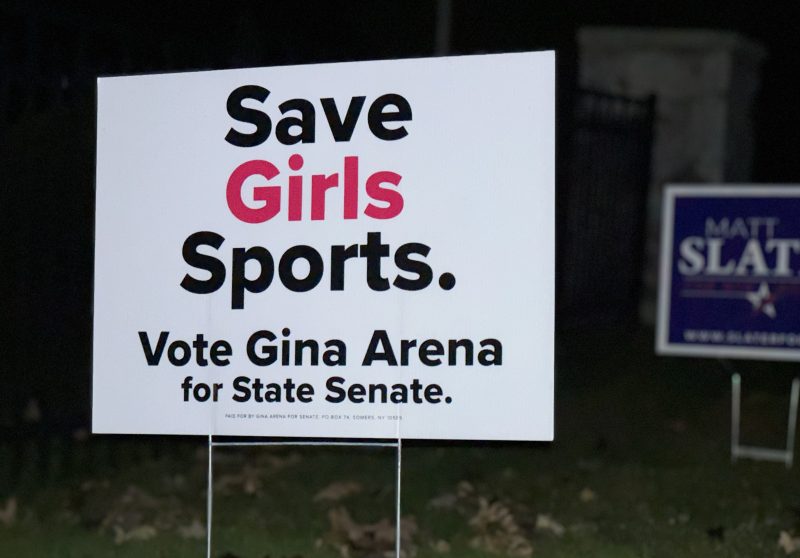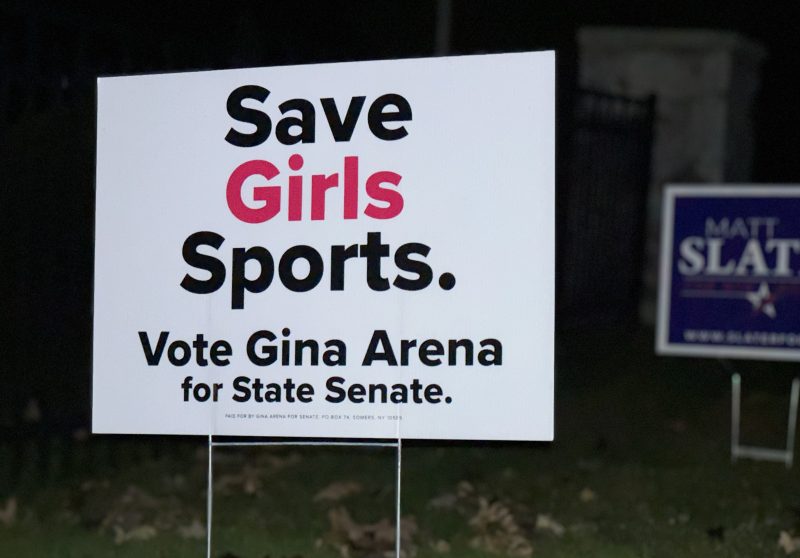
A New York candidate tests the electoral limits of anti-trans rhetoric

Among the placards dotting lawns in northern Westchester County, N.Y., in the weeks before the November election are ones that do far more than simply remind passersby about the names of local candidates. Over the past few weeks, scores of white signs have appeared that instead prominently feature a pithy slogan: “Save Girls Sports.” Only below that, in much smaller print, is Republican state senate candidate Gina Arena named.
“People want signs!” Arena celebrated when we met at a diner in the town of Hawthorne last week during a lunch break from her nearby job with the county. “I mean, we ordered 250 signs and we had to order 500 more because people were calling, ‘I want the signs!’”
Arena had signs out before the ones about girls’ sports, normal ones that simply had her name and the position she sought. Those, it seems, didn’t inspire similar demand. So now, by all outward appearances, her campaign is singularly focused around this vaguely articulated idea that sports for girls are under threat.
Visit her campaign website and a landing page informs you that, yes, this is the website of all those lawn signs you’ve been seeing. They’re necessary, it explains, because “ideologues in Albany want to sacrifice Girls sports to achieve some type of genderless Utopia in New York.” This, the page adds, is “nuts.”
Arena’s campaign has other areas of focus, too, she said, though she didn’t exactly rattle them off in our conversation. There was an issue in Croton-on-Hudson where she opposed putting in an apartment building near the train station and a proposed lithium-battery storage facility in Somers that she also opposed. Her campaign website listed other older-vintage and national issues like immigration and inflation, but those didn’t come up when we spoke.
In one sign that the success of “Save Girls Sports” had caught the campaign by surprise, I noted that the “Issues” page on the site didn’t mention it at all. (It has since been added.) I was assured that other campaign messages were coming.
“Our mailers have not come out yet,” Arena said. “There will be more mailers coming on various topics.”
For the time being, though, the message is “Save Girls Sports” — a message that even Arena admitted wasn’t immediately perceptible to voters.
“It originally came from the New York State Board of Regents,” she said, “because they were trying to put in legislation to make it gender-neutral for sports for boys and girls. In other words, if a boy wanted to play on the girls’ field hockey team, he could potentially bump a girl out of her spot. And I felt strongly that that’s not why we have girls’ sports and boys’ sports.”
The proposal would not allow boys to unilaterally play on girls’ teams. It instead would have allowed students to try out when there was no team at their school that matched their gender.
“I know a lot of people talk about Prop 1 as well,” Arena added. “And it really — for us, for my team and for me — it started with the Board of Regents.”
Non-New Yorkers — and probably many New Yorkers — won’t be familiar with Proposal 1, an amendment to the state constitution that’s on the November ballot. Called the “Equal Rights Amendment,” it extends protections against unequal treatment based on race and religion to also include age, gender, “sexual orientation, gender identity, gender expression,” and “reproductive healthcare and autonomy.” And here we get to the heart of the thing. Whatever its purported roots in the Board of Regents, “Save Girls Sports” is a phrase that evokes the triggering issue of transgender identity.
When she was explaining how popular the signs had become, Arena shifted from her tacit mention of Prop 1 to an acknowledgment of how the slogan stirred the passions of people opposed to having transgender girls play on girls’ sports teams.
“Parents — dads, especially even more than women, are finding — dads are so protective of their daughters — that they just don’t like the idea of the possibility of a man, male being in the same locker room,” Arena said. “They don’t — It goes against what a lot of people believe.”
William O’Reilly, an adviser to Arena’s campaign, was with us at the diner.
“I’ve never seen an issue explode like this, and I’ve done this for 40 years in New York,” he said enthusiastically. “It’s just: boom.”
The reason it was so popular, he speculated, was that people had previously been “afraid of being canceled.”
“That’s really what it comes down to,” Arena agreed. “You’re watching your words because you don’t want to upset anybody, but you’ve got this situation that needs to be talked about, and we have to bring it up.”
The following day, I spoke with retired police officer John DiNoia, 43, as he was vacuuming out his pickup truck. DiNoia was one of the sorts of fathers Arena mentioned, it turned out, but he did not seem to be particularly concerned about watching his words.
I’d asked about the election in general, with DiNoia expressing his support for former president Donald Trump. I then asked about local issues, without specifically mentioning Arena or her sign, visible on his lawn over my shoulder. But that’s where he started.
“I don’t believe in a f—ing dude walking into a girl bathroom or changing room with his junk hanging out, because I have a daughter,” DiNoia told me. “I don’t believe in biological men competing in women’s sports.”
This, it seems, would fall into the “Prop 1” bucket.
When Arena told me that the issue was so important that “we have to bring it up,” I asked if there had been any examples of transgender students seeking to play on a school sports team.
“I don’t think I’ve heard yet of anything in our immediate district,” Arena admitted.
Her opponent, incumbent state Sen. Pete Harckham (D), didn’t indicate that he’d heard about any such issues, either. We spoke at a different Westchester County diner the same day, surrounded by clinking glasses and chattering kids.
“This is not an issue in our local communities,” Harckham said. “It’s driven by this obsession with transgender people.” The issue, he said, was “coming from the fringe. This is the Moms for Liberty crowd.”
Harckham and Arena faced off two years ago, as well. Then, he won by about seven percentage points, an improvement over his 2020 victory over a much-better-known Republican opponent. He has also outraised Arena significantly, with $38 on hand at the end of July for every dollar of Arena’s. But he understood that this was no guarantee of victory. “Just by the nature of the district,” Harckham said, “because she has the R next to her name, 45 percent of the folks in the district are going to vote for her.”
He admitted that voters brought up Arena’s signs, saying that they were often confused about what they meant. Once he explained, he said, they viewed the effort as “crazy.”
“While the Hudson Valley may be fiscally conservative, for the most part, it’s a very tolerant and diverse community,” Harckham told me. “So this notion that we need to protect ourselves against trans kids — who are the most fragile kids in our society, highest rates of suicide, highest rates of mental health disorders, substance use disorders — we should be wrapping our arms around these kids and not demonizing them the way they do in the Deep South.”
A May poll from Siena College found plurality support for enshrining protections for transgender people in the state constitution, with a plurality in the New York City suburbs — including Westchester County — also expressing support.
Karen Svoboda, 53, lives just a bit farther up the Hudson River Valley from the district Harckham represents. She’s the executive director of Defense of Democracy, a nonprofit organization focused on promoting inclusive environments in public schools and libraries. Earlier this year, Defense of Democracy was involved in counterprotests at a high school in the Wappingers district after a student complained about the bathroom being used by a trans student.
Svoboda is also a mother to a nonbinary student at that high school.
“There’s a lot of buzzwords that certain members of extremist organizations or groups have used to create a misguided sense of fear and panic in the community,” she said when we spoke by phone this week. “And ‘protecting women’s sports’ is another one of these.”
“Fear is a big motivator, and I think they know that,” she added. So, they choose “to say ‘it’s X,’ but really what it is is Y.”
When we spoke, Arena insisted that her focus wasn’t really on transgender students, despite the enthusiasm from those fathers. It was, instead, on “protecting the girls and making sure girls still have their rights.” So I asked her what legislation she planned to advance once elected to the state senate, given the importance of the issue.
“That’s a good question,” she said, stopping to consider it briefly. She came back to an idea she’d offered earlier, to create something akin to the Special Olympics but for transgender students. She had a daughter with autism, she explained, who’d participated in the Special Olympics, and she saw how her daughter had benefited.
“Everybody needs a fair shot at living their life and having things fair for them,” she said of the proposal to create new teams for transgender students. “I think that would be the logical answer.”
“It’s like the bathrooms,” she said. “They’ve found ways to make that work.”
I asked Svoboda how she felt about the idea of a Special Olympics-style accommodation.
“Now we were talking about segregation, and ultimately we are talking about making these children, who are already a little different, the absolute other,” she said, “so that they are not participating in the same sports as their friends, their peers. Absolutely not. No. Hell no.”
Earlier, I’d asked her how she would respond to seeing a lawn sign carrying Arena’s slogan.
“Just grief. And sadness,” she said. “Not for the kids like mine who have supportive families who love them and will go to bat for them, but to all of the children who are in elementary school right now whose futures are so in question.”
About 3 percent of New York teenagers identify as transgender, according to research from the Williams Institute at the University of California at Los Angeles School of Law. That’s the highest percentage of any state in the country.
I live in the district. The day after I met with Arena, I received my first mailer from Arena’s campaign as promised — a piece of literature addressed to me rather than my wife.
“PETE HARCKHAM wants to END girl’s sports and force females to compete against biological males,” it read on one side above a photo of a girl carrying field hockey equipment. (A representative for Harckham forcefully rejected this claim.) “Who will fight for her …”
On the reverse, Arena was pictured standing with a group of women and girls, all holding “Save Girls Sports” signs. Down in one corner, under the headline “PRO FAMILY,” something other than girls’ sports was mentioned: Arena also opposes congestion-pricing plans like the one recently derailed in New York City.
She has not yet featured this on lawn signs.
